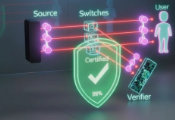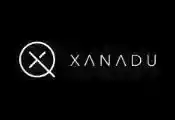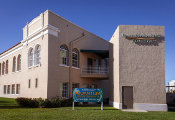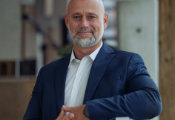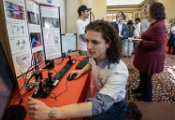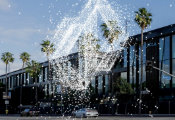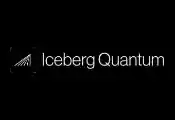Uma Girish Wants to Speed Up Quantum Computers
November 05, 2025 -- Quantum computers operate on the principles of quantum mechanics, the now century-old theory that describes the world around us in often counterintuitive ways. Quantum mechanics gives quantum computers their potential power—and Columbia postdoctoral fellow Uma Girish wants to understand why.
“It’s a difficult question to answer, but I’m developing mathematical models that can abstract away some of the more complicated details and help us understand the power and limitations of quantum computers,” said Girish, who works with Henry Yuen, Srivani Family Associate Professor of Computer Science at Columbia.
In particular, she wants to pinpoint what gives quantum computers a speed advantage over their classical counterparts. For her work, she recently received a Boeing Quantum Creators prize, which included an invitation to present her research, “Forrelation and the Foundations of Quantum Advantage,” at the 2025 Chicago Quantum Summit.
In this Q&A, Girish discusses those foundations and how she found her way into the field.
Can you explain the subject of your prize talk?
A common theme behind quantum computers gaining a speed advantage over classical computers involves what are known as Fourier transforms, a mathematical tool that breaks a function into a series of periodic waves. Quantum computers are better at applying Fourier transforms than classical computers—that's why they're able to outperform classical computers at tasks like factoring.
But that’s not the end of the story! Not all quantum algorithms can implement a Fourier transform, and you need to separate out “noisy” algorithms from those with cleaner quantum resources. Ideally, quantum computers should start off with all of their quantum bits, or qubits, in a fixed state. But, the environment can interfere and corrupt the qubits. This is “noise,” and it induces errors. If the quantum circuit is too shallow, lacks sufficient entanglement, or suffers from noise, it can't solve Forrelation. That’s what makes Forrelation such a useful benchmark. It pinpoints which quantum resources are genuinely necessary.
Why is this important?
Quantum computers and classical computers are in a bit of an arms race. There are lots of claims about quantum computers gaining an advantage, but the details can be fuzzy, and we don’t always understand why classical algorithms can’t do the same things.
Quantum computing really is in its infancy, so we are working to understand it at a theoretical level. Quantum computers exist, but right now, they are addressing highly tailored, artificial problems. The challenge is to identify what realistic problems quantum computers can solve better than classical computers. But that’s where we are heading.
There are different types of quantum computers. Does the hardware matter?
We are starting to bridge the gap into experimental setups, and I do take inspiration from quantum computers. For example, they are still very noisy! So what can we do with a noisy device?
I’m drawn to foundational questions, but I want to translate theoretical understanding into practice: why haven’t we implemented theoretical speedups, like Forrelation, in real life?
What drew you to quantum computing in the first place?
I started my PhD at Princeton exploring the mathematical limitations of classical computation. But it was fascinating to learn about quantum computing. That helps me see where classical computing breaks down, and inspires a new way of thinking.
Where are you heading next?
I’ll be an assistant professor of computer science at the University of Toronto, starting next fall. I’m looking forward to establishing my research group and helping to build the quantum computing community there. I really enjoyed Henry’s Intro to Quantum Computing course, and I hope to introduce a similar course. And we will, of course, stay in collaboration.
And where can we find you when you aren’t at the whiteboard?
I love New York, so where can I even start? But I’ve really gotten into running. I spend a lot of time in Central Park and along the Hudson.


